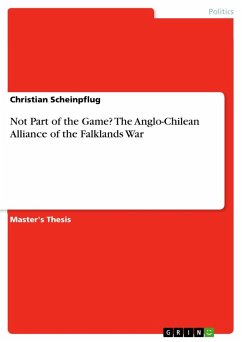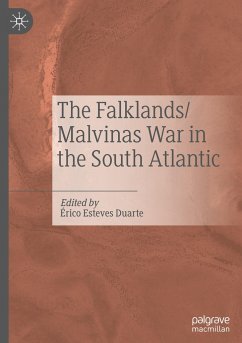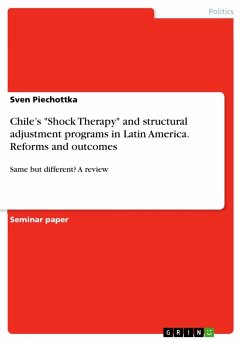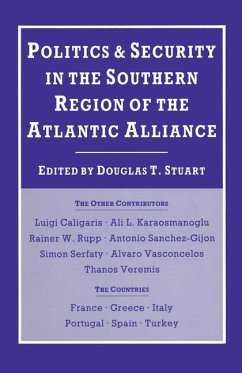
Not Part of the Game? The Anglo-Chilean Alliance of the Falklands War

PAYBACK Punkte
0 °P sammeln!
Master's Thesis from the year 2015 in the subject Politics - Region: Middle and South America, grade: 1,5, University of Leicester (Department of Politics and International Relations), language: English, abstract: One spectrum of the orthodox narrative of the Malvinas campaign in 1982 implies that Argentina's loss originated with its megalomaniac leadership. Their supposedly erratic moves cost the country 649 lives and caused national humiliation, but also initiated the process that terminated dictatorship. The other spectrum recognises a decisive, if hard-won, military success that turned int...
Master's Thesis from the year 2015 in the subject Politics - Region: Middle and South America, grade: 1,5, University of Leicester (Department of Politics and International Relations), language: English, abstract: One spectrum of the orthodox narrative of the Malvinas campaign in 1982 implies that Argentina's loss originated with its megalomaniac leadership. Their supposedly erratic moves cost the country 649 lives and caused national humiliation, but also initiated the process that terminated dictatorship. The other spectrum recognises a decisive, if hard-won, military success that turned into Margaret Thatcher's landslide re-election victory. This orthodox narrative, however, blurs a thorough analysis of the war, because it misinterprets its causes.This study moves the analysis into uncharted waters by investigating the alliance between Britain and Chile during the war. Chile's effort was significant insofar as it helped to keep British losses down and provided intelligence that eventually led to the decision to sink the Belgrano. Britain, as part of the deal, transferred arms to Chile and helped to brush up the Pinochet dictatorship's image abroad; thus sustaining it through its most precarious period, the severe economic crisis of 1982.Theoretical input by offensive realism and neo-Marxism provides the overall frame. Both are structural theories with particular focus on soil and territory. Chapter 2 distils prevalent aspects of both approaches and defends their use over agency-based theories like social constructivism and interpretivism. Chapter three is the entry point to Southern Cone geopolitics as it analyses the defining events of Chilean-Argentine relations: the Pacific War of 1879-1883 and the Beagle Crisis in 1978. After Chapter four will have put these events in perspective the unorthodox conclusion emerges, arguing that the Falklands War was not an attack on British sovereignty per se but a move against Chile to obtain hegemony in the South Atlantic.













